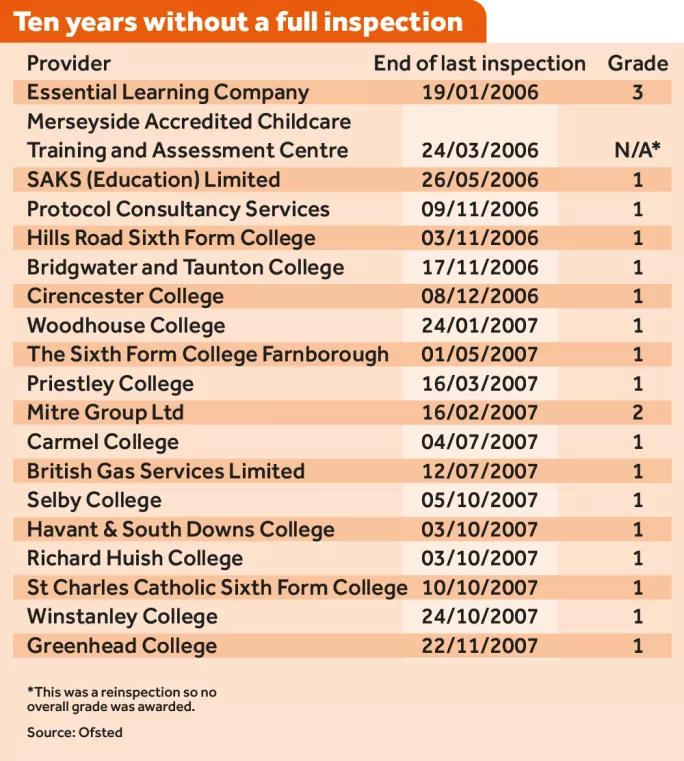An inspector calls...but only once a decade

“Ofsted outstanding since 2006-7,” proclaims Cirencester College’s website proudly. And it’s true: it has been rated “outstanding” since an inspection that took place in February 2007.
But this was carried out by Ofsted’s predecessor, the Adult Learning Inspectorate (ALI) - and inspectors haven’t been back to carry out a full inspection since.
Ofsted stopped routine inspections of “outstanding” providers in 2011; it returns only if its risk-assessment process identifies a decline in performance.
For principal Jim Grant, the long break between inspections is unsettling. “You keep thinking, ‘It might be this year,’” he says. “But we know they look at our results every year and monitor constantly.”
There is a level of nervousness around an impending Ofsted visit, Grant admits: “What we try and do is we have a small team [working] on it, but we try not to mention it to the rest of the staff if we possibly can.
“I am confident we are ‘outstanding’, but you can never be confident about being inspected, because things can happen in the three or four days they are in the college, and Ofsted parameters change all the time as well.”
Cirencester is one of 19 FE providers that have not been subjected to a full inspection by Ofsted for more than a decade.
Prestige and private contractors
Several of them are prestigious sixth-form colleges well known to Oxbridge admissions officers, such as Hills Road Sixth Form College in Cambridge.
Others, however, are private training providers that have avoided inspection as a result of spending part of the intervening period being funded only through subcontracting, rather than direct government contracts.
For one of them, Essential Learning Company, based in Greater Manchester, it was on this exact day 12 years ago that inspectors departed, having rated its provision as “satisfactory” (the grade was renamed as “requires improvement” in 2012). And a further seven providers with an overall grade 3, as well as two rated “inadequate”, have not been visited by Ofsted for a full inspection in at least five years. Seven of the nine are currently on the Education and Skills Funding Agency’s register of apprenticeship training providers.

Yvonne Lalley, Essential Learning’s managing director, says that it was “a subcontractor via main prime [contractors] - therefore, we weren’t required to be inspected via Ofsted directly.”
Now that it is once more being directly funded, Essential Learning is “now back in scope for an Ofsted inspection”, says a spokesman for the inspectorate.
“When a provider gains funding where it has not had it before, it will normally be inspected within three years. We will review these nine training providers as part of our risk-assessment process, which will take account of the available data and any concerns expressed.
“Normally, we inspect a college or skills provider judged to require improvement within two years if it remains open and funded.”
According to the Ofsted handbook, a college created in a merger will normally be inspected as a new provider within three years.
In 2016, Bridgwater College - last inspected in 2006, when it was rated “outstanding” - merged with “good” Taunton College to create Bridgwater and Taunton College.
The “new” institution is eagerly awaiting its first full inspection, says a spokeswoman: “The process of inspection is an important opportunity for us to demonstrate the high-quality teaching and learning experiences that we deliver for our students every day, and we look forward to welcoming the Ofsted team and to sharing the achievements of our staff and students.”
Last year, there were examples of colleges previously rated “outstanding” experiencing a sharp decline.
Holy Cross College, a sixth-form college in Greater Manchester, dropped from “outstanding” to “requires improvement” after a decade-long gap between its last visit in 2007 and the return of Ofsted inspectors last year. Blackburn College, too, dropped down two grades when inspectors returned after eight years’ absence.

Managing risk
David Hughes, chief executive of the Association of Colleges, is not concerned about the long gaps between inspections.
“Those colleges that have achieved ‘outstanding’ in the past have very good continuous improvement strategies,” he argues.
Bill Watkin, chief executive of the Sixth Form Colleges Association, says: “If an ‘outstanding’ college is not inspected, it is because the data has shown that standards are still high and there is no risk of a decline.”
But he adds: “As the new [A-level] curriculum and qualifications come on stream, as funding cuts make a deeper impact and as support services are put at risk, a small number of ‘outstanding’ colleges have been inspected recently and have been graded ‘good’ or even ‘requires improvement’.
“It is reassuring to note that these are rare exceptions, and conversely a similar number of ‘good’ colleges have been upgraded to ‘outstanding’.”
Mark Dawe, chief executive of the Association of Employment and Learning Providers agrees, saying that he “fully supports” the risk-based approach taken by Ofsted. “As long as Ofsted can take the data, look at it and then decide who is more of a risk, and then look at those more closely, that is what we are looking for,” he adds.
But even providers exempt from routine inspection can’t afford to let their guard down, he explains. “A provider that has not been inspected in four or five years is always going to wait for that call. When someone goes over three years, they start worrying about Ofsted coming, and it changes the way providers do things. It doesn’t allow them to be free.”
You need a Tes subscription to read this article
Subscribe now to read this article and get other subscriber-only content:
- Unlimited access to all Tes magazine content
- Exclusive subscriber-only stories
- Award-winning email newsletters
Already a subscriber? Log in
You need a subscription to read this article
Subscribe now to read this article and get other subscriber-only content, including:
- Unlimited access to all Tes magazine content
- Exclusive subscriber-only stories
- Award-winning email newsletters